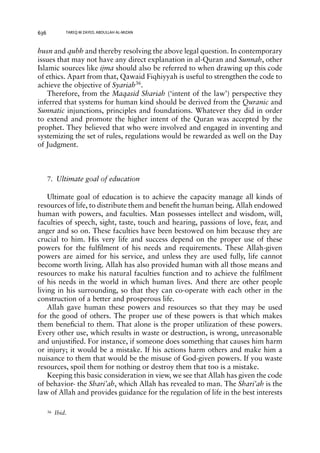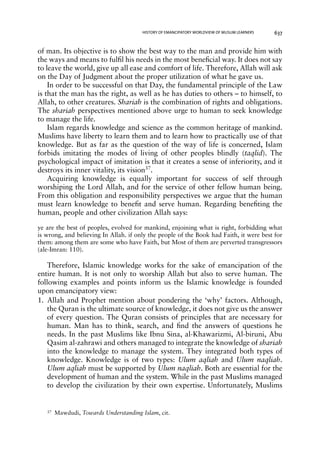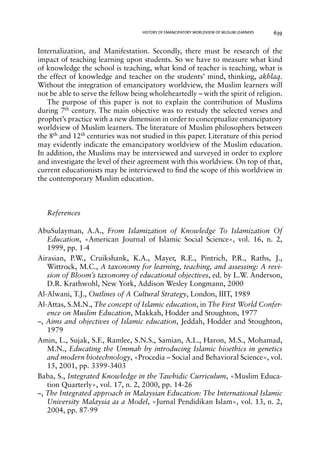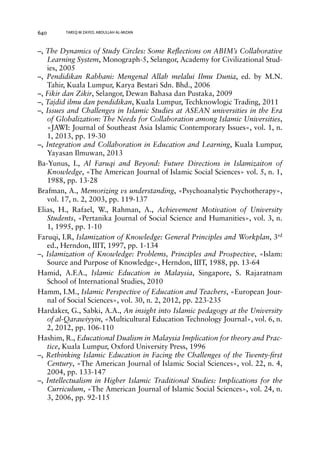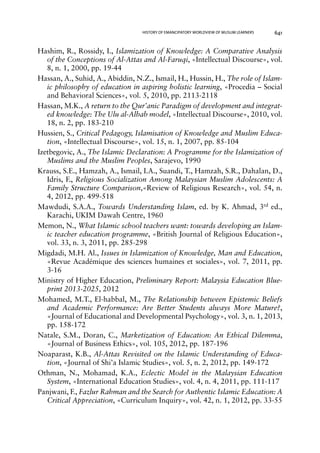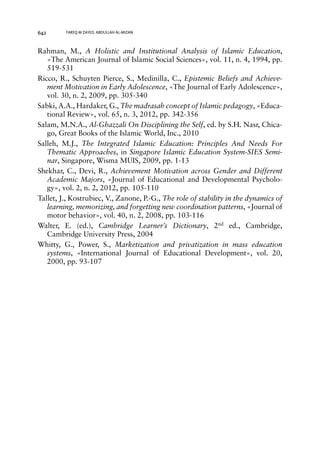The document discusses the historical and contemporary challenges faced by graduates of Islamic education institutions, particularly in Malaysia, highlighting their failure to meet social expectations due to a lack of integration between Islamic epistemology and educational content. It argues that an emancipatory worldview, rooted in history and the Quran, is essential for empowering Muslim learners to effectively contribute to society. The authors propose that integrating historical insights with modern pedagogical approaches could rectify perceived intellectual poverty among graduates and enhance their ability to serve both personal and communal needs.
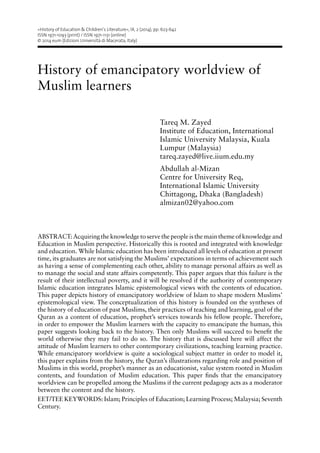
![624 TAREQ M ZAYED, ABDULLAH AL-MIZAN
Introduction
A general observation on the graduates of Islamic integrated education
institutions in Malaysia has revealed that Muslim learners are not satisfying
the social expectations in terms of performance such as having a sense of
complementing each other, ability to manage personal affairs as well as to
manage the social and state affairs competently. The contributing fact behind
this intellectual poverty may be the worldview of the graduates while the purpose
of the education is to instil the worldview1. This condition has happened in
the Muslim learners when the worldview has been corrupted in educational
contents.
Merely, the Islamic subject matter cannot resolve the issue of worldview. So,
the authors’ general observation is that the emphasis on religious subjects taught
in the schools did not yield much benefit in terms of Muslim development. On
top of that, in most Muslim countries, the essence of the school curriculum is
dichotomous2. The curriculum is either too religious such as Islamic education,
or too secular such as conventional education. In practice, the Islamic education
primarily consists of and founded on knowledge of the Quran, Hadith, Fiqh,
Aqidah, Arabic etc. Though this knowledge is essential for every Muslim it is
not enough to empower the learners with the ability to serve the world3. In
addition, the concept associated to goal and objective of education in Islam
may not be possible to achieve through the current curriculum offered by
education system because they are loosely integrated. Ignoring the history of
education of early Muslims in some institutes of Malaysia, Islamic subjects
and conventional subjects are taught together (in a day, but different time,
for example, in the morning and afternoon)4 and the teachers think that this
education will change the learners. While indeed, education and Knowledge
must be founded upon the Islamic epistemology. In the past Islamic education
integrated Islamic epistemology with the body of conventional knowledge and
1 S. Baba, The Integrated approach in Malaysian Education: The International Islamic
University Malaysia as a Model, «Jurnal Pendidikan Islam», vol. 13, n. 2, 2004, pp. 87-99; R.
Hashim, Intellectualism in Higher Islamic Traditional Studies: Implications for the Curriculum,
«The American Journal of Islamic Social Sciences», vol. 24, n. 3, 2006, pp. 92-115; S. Hussien,
Critical Pedagogy, Islamisation of Knowledge and Muslim Education, «Intellectual Discourse»,
vol. 15, n. 1, 2007, pp. 85-104; S.E. Krauss et al., Religious Socialization Among Malaysian
Muslim Adolescents: A Family Structure Comparison, «Review of Religious Research», vol. 54,
n. 4, 2012, pp. 499-518.
2 R. Hashim, Educational Dualism in Malaysia Implication for theory and Practice, Kuala
Lumpur, Oxford University Press, 1996, p. 204.
3 A. Izetbegovic, The Islamic Declaration: A Programme for the Islamization of Muslims and
the Muslim Peoples, Sarajevo, [s.n.], 1990.
4 A.F.A. Hamid, Islamic Education in Malaysia, Singapore, S. Rajaratnam School of
International Studies, 2010-Ministry of Higher Education (Preliminary Report: Malaysia
Education Blueprint 2013-2025), 2012.](https://image.slidesharecdn.com/heclix22014zayed-almizan-141207194923-conversion-gate01/85/Hecl-ix-2_2014_zayed-al_mizan-2-320.jpg)
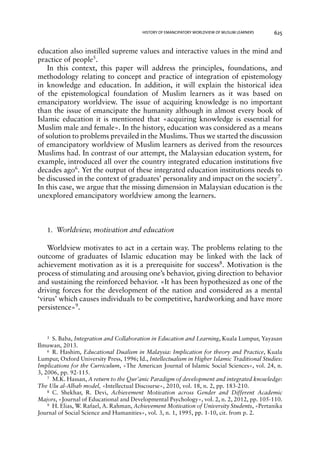
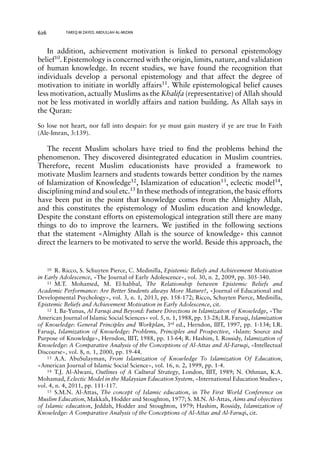
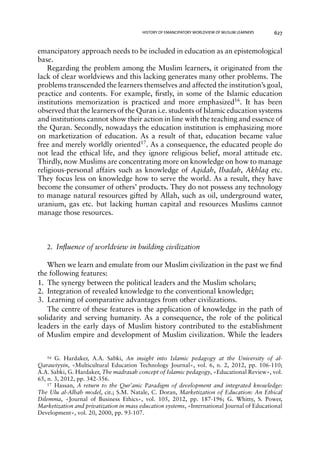

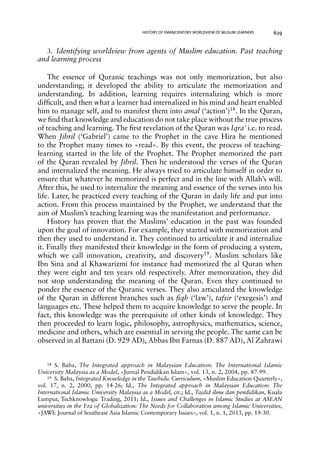
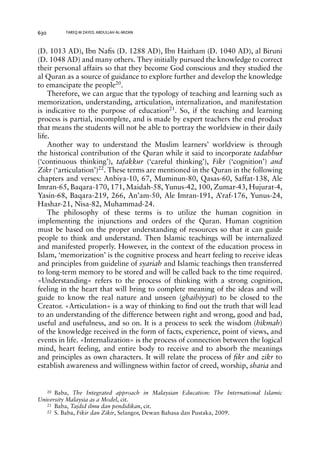
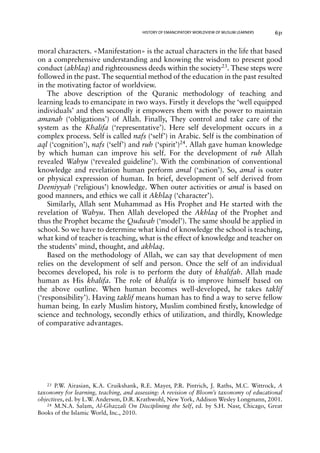
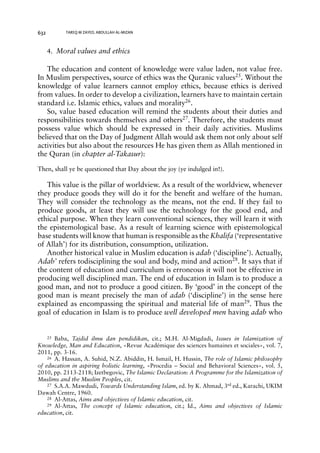
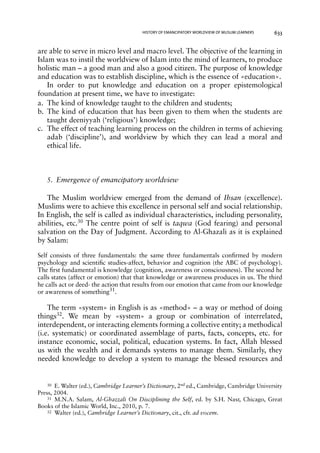
![634 TAREQ M ZAYED, ABDULLAH AL-MIZAN
so that the systems benefit the human being, build the civilization, and make
life easy and establish control over indiscipline, chaos, disorder, confusion etc.
They understood the core of adopting system is the benefit of human kind,
independence from the others.
Muslim constructed the idea of ‘system’ by looking at the verses of the
Quran regarding Ihsan (excellence), community services, social and personal
rights given by the Islam, and so on. It is stated in the Quran:
[…] do good as Allah has been good to you […] (al-Qasas: 77).
Then shall anyone who has done an atom’s weight of good, see it! and anyone who has done
an atom’s weight of evil, shall see it (Zilzal: 7-8).
The above verses formed the concept of systematic social work among
Muslims. It was, however, more than a philosophical concept, but a practical
draft, even we believe that the social work is a part of Ibadah (worship) as
Muslim consider them necessarily ‘an obligation’ like prayers and fasting. It
seems that many are not aware of the Quranic basis for the duty to serve human
beings. There are many verses in the Quran that deal with the necessity of social
service: 107; 74:38-46; 90:12-18; 89:17-24; 92:5-10. The more prominent one
is the chapter Al Ma’oon in which Muslims were divinely mandated to attend
to the social needs of others, not as a philanthropic gesture, but as a prerequisite
condition for faith (Iman) itself, and a tangible acceptance of the Hereafter.
In al-Ma’oon 107:1-7, Allah said: «Have you ever seen a human being who
contradicts the (essence of) faith? That is the person who pushes the orphan aside
and does not promote feeding the needy». As the khalifa of Allah, Muslims had
to invent comprehensive and effective social work and services. The significance
of social work led the Muslims to think about acquiring knowledge to develop
a system for serving others.
At current time, education systems in Muslim countries like madrasahs
are not encouraging to promote the concept of Ihsan in real life. Instead, they
are focusing more on knowledge of how to manage self – such as belief on
Allah, Aqidah, Ibadah, how to perform Salat, Siyam, Hajj etc. Though these
are the very basic of Deen, Other than Ibadah and Aqidah we need the Shariah
that contains rules and regulations, and so it requires other aspects such as
values, ethics, and Akhlaq. If we measure the Ruhaniyyah (spiritual) dimension
of Muslims all over the world, we will find to some extent that the level is
relatively high. But if we look at the amal such as the conduct, punctuality,
and interpersonal relationship of Muslims we will find it relatively low33. This
indicates that the achievement from Ibadah and Shariah does not have an
33 Baba, Pendidikan Rabbani: Mengenal Allah melalui Ilmu Dunia, cit.; Id., Fikir dan Zikir,
cit.; Id., Tajdid ilmu dan pendidikan, cit.](https://image.slidesharecdn.com/heclix22014zayed-almizan-141207194923-conversion-gate01/85/Hecl-ix-2_2014_zayed-al_mizan-12-320.jpg)

